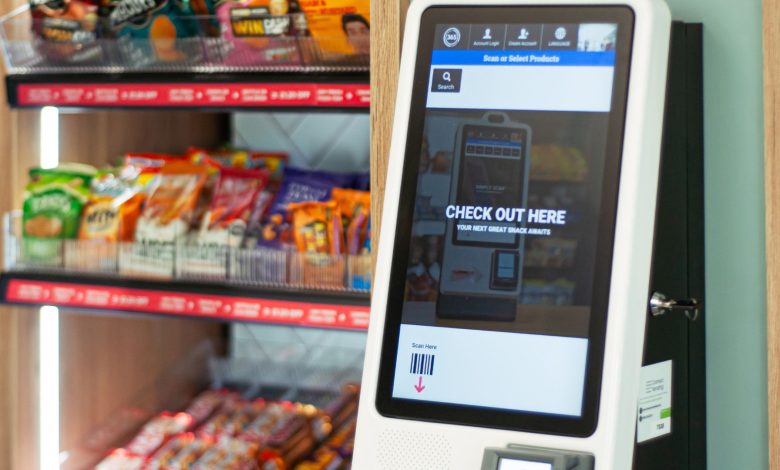
Cashless payment systems have become the new norm in the vending industry, driven by the consumers demand for convenience, speed and hygiene. Data from Cantaloupe shows that cashless transactions now represent 67% of all vending purchases.
Over the past few years, Artificial Intelligence has become an essential tool for operators, helping them to track inventory, secure payments, and detect small discrepancies. As vending payment systems move away from accepting cash payments to being fully digitalised consumers become more at risk to threats such as digital fraud and data breaches.
The Rise of Cashless Vending
The transition from cash vending machines to digital payment systems represents a major shift for the retail world. From the same Cantaloupe study, cashless payments now account for 71% of all vending machine sales in 2024, an increase of 17% from 2023, with mobile payments making up 77% of all contactless vending transactions.
Research also suggests that food and beverage vending machine sales will grow another 8% in 2025, these sales are expected to be driven by unattended retail trends and changing consumer expectations towards payment methods.
The Security Challenge in Vending Payment Systems
In today’s day and age processes are becoming increasingly more digitalised, and vending machine security is no exception. But this digitalisation comes with several threats for operators.
Industry data indicates that 85% of vending machines have, at some point, have been breached. Although there are several ways these security breaches can happen, card skimming remains one of the most common threats. Fraudsters can capture credit card information by skimming devices that are attached to card readers, the biggest concern from this is that it is such a discreet process that it often happens undetected. Criminals can also physically tamper with payment devices to manipulate the hardware and extract stored data; this is usually what happens in Network and API breaches.
These acts of fraud can drain bank accounts before the victim has even realised that their data has been compromised. Security breaches can also lose the consumers trust, which can be a damaging outcome for the vending machine industry which is built on convenience and reliability. Which is where AI driven technology comes into play.
How AI Strengthens Cashless Security
Real-Time Fraud Detection
AI-powered fraud detection systems can reduce false positives by up to 70% and increase detection accuracy by 90%, which is a significantly higher result than traditional approaches which rely on predetermined rules. AI powered machines assess multiple variables to analyse consumers transaction patterns to detect fraud. These variables usually consist of factors like transaction timing, purchase frequency, location, the amount purchased and the card itself.
For example, if the same card information is flagged making multiple transactions in different locations in a close time period, then the AI security system is able to flag and log the suspicious activity quicker than a traditional vending machine security system would.
Behavioural Analytics
Vending machines that have AI systems built into them are able to analyse your purchasing history and establish your “normal” purchasing behaviour through machine learning models. Behavioural profiling creates detailed profiles based on how users interact with digital platforms, meaning that AI can detect fraudulent activity by analysing the anomalies.
When it comes to secure vending transactions, the AI system learns your typical usage patterns on specific machines. AI payment systems can raise an alarm when there have been multiple failed transactions in a quick succession. This approach helps catch fraud attempts that otherwise may have slipped past traditional verification methods.
Predictive Maintenance and Tamper Alerts
Modern day AI technology is capable of going beyond traditional transaction monitoring, advanced systems can identify early signs of hardware tampering or connectivity issues to prevent fraudulent activity. AI can predict system failures, detect software vulnerabilities, and flag unusual network usage in real time.
For vending operators, this means receiving alerts when there’s an irregularity in network traffic or when firmware changes suggest unauthorised access. By catching these indicators early, operators can address these issues quickly before any fraudulent attacks can take place.
Data Protection and Compliance
The Payment Card Industry Data Security Standard (PCI DSS) sets a standard security requirement for all entities that store, process, or transmit cardholder data, with significant penalties for non-compliance. For vending machine operators who handle thousands of transactions daily, manually monitoring the compliances can quickly become ineffective. AI systems can automate many compliance related tasks, from securing the payment data to encrypting sensitive information making the entire process more accurate and efficient.
Business Impact: Efficiency and Trust
The benefits of integrating AI security systems into vending machine payment systems go beyond reducing risks. Businesses using AI fraud detection reduce fraud losses whilst also increasing the chances of maintaining or improving their customer satisfaction scores and improving their bottom-line profitability.
Data breaches are becoming more common and regularly make the news headlines, so a vending machine company’s commitment to security can quickly become an advantage over their competitors. The nature of a vending machine company is competitive, whether it’s competing for a premium location or winning a new client contract, which is why prioritising vending machine security can give you a competitive advantage.
It is becoming increasingly more common that corporate workplaces, hospitals, and educational institutions require a documented security protocol from all of the contractors before approving the work including installing new vending machines. AI powered security systems provide the credibility and assurance these client’s demand.
Additionally, the real-time analytics generated by the AI systems offer valuable insights into the business and help operators optimise machine placement, product selection, and pricing strategies based on actual usage patterns rather than guesswork. This allows vending machine companies to provide a more personal and tailored service to their clients.
Challenges and Considerations
Even though the advantages seem strong, there are several challenges that come with AI implementation in vending machine payment systems. For smaller businesses the initial cost of AI security systems can be too expensive for them to justify the transition from a traditional vending machine payment system. Then there’s the ongoing training and expertise needed to maintain the technology, meaning that organisations will need to invest in role specific training alongside the cost of the technology.
As fraudsters become more aware of how AI works it becomes easier for them to develop polymorphic malware that is capable of altering its code to bypass detection, meaning that defensive AI systems must constantly learn and adapt to tackle these changes.
Without regular AI software updates an endless circle is created where yesterday’s cutting-edge security becomes today’s vulnerability. Operators must also keep in mind the ethical considerations around AI, such as data privacy, to ensure their AI systems don’t discriminate against legitimate users or collect more personal data than what is necessary for security purposes.
It’s important to recognise that AI compliments rather than replaces human oversight. Weak human oversight may cause a delay in incident detention or response time when AI systems generate the appropriate alerts. Fraud prevention procedures are most effective when they combine AI’s analytical abilities with human judgement when investigating flagged transactions to make a final authorisation decision.
The Future of AI in Vending Payments
With all of the latest news headlines surrounding fraud it is no surprise that biometric payments, using fingerprint or facial recognition, are becoming one of the most commonly used payment methods. It can be argued that biometric payments are more secure than traditional card payments due to the account owner being verified before the transaction takes place which reduces the risk of fraud.
As AI technology continues to adapt to the latest fraud techniques it is evolving to take a proactive thread anticipation approach to predictive fraud prevention. Experts are predicting that future AI systems will be able to analyse fraud patterns happening across the world to identify emerging threats before they gain momentum and learn how to block these attacks across vending networks to minimise the damage done.
With a deliberate, risk-informed approach, AI can be an effective tool for cybersecurity and resilience while helping to preserve the integrity and stability of both the machines and the consumers’ financial systems. Due to these technologies the vending machine industry is becoming part of a smarter, safer, and digitalised retail environment.
Conclusion
The digital transformation of vending payment systems has created unique opportunities for efficiency and customer experience, but these benefits come with a number of security challenges. AI provides real-time insight, adaptive capabilities, and continuous learning that traditional security measures simply cannot match. From quickly detecting fraudulent transactions to following all of the security and data compliances. AI has become indispensable for modern vending payment systems.




